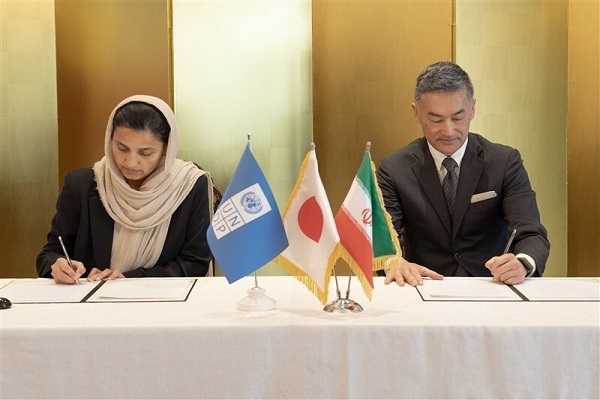
TABNAK, Dec, 01 : Japan has recently announced that it allocated a grant aid worth US$4.5 million for projects such as reviving Urmia Lake and developing wetlands in Iran hit severely due to climate changes.
The grant aid was provided with the title of Project for Developing Conservation Systems of Wetlands in Lake Urmia and Other Wetlands including their Surrounding Communities.
The allocated budget size is 690 million yen and the project site is Lake Urmia in the provinces of East Azarbaijan and West Azarbaijan, Shadegan wetland in Khuzestan province, Parishan wetland in Fars province, and Anzali wetlands in Gilan province.
The project will develop irrigation systems that respond appropriately to climate change and install water management systems. It would also create sustainable industries such as ecotourism for environmental protection and economic development in the areas surrounding these wetlands.
During the signing ceremony, Japanese Ambassador to Tehran Tsukada Tamaki, Deputy Resident Representative for UNDP Gullbahor Nematova, and the representative of Iran's Department of Environment (DOE) delivered separate speeches.
"Over the past ten years, the unwavering support from the People and the Government of Japan has positively impacted agricultural productivity and enhanced livelihoods in target communities. In the next four years, we will continue promoting innovative, water-efficient agricultural practices, while emphasizing scaling up for a better future for all,” Nematova said.
Speaking at the ceremony, the ambassador of Japan underlined that Iran has 26 valuable wetlands listed under the Ramsar Convention, including Lake Urmia, adding that these wetlands, which are home to diverse species and migratory birds, must be conserved in cooperation with the international community.
Over the past 10 years, Japan has provided support for Lake Urmia conservation, but in order to further restore the wetland, it is essential to manage uncontrollable water extraction, develop an irrigation system that appropriately responds the climate change, and create sustainable industries such as eco-tourism, he said.
He expressed hope that the new project signed today will contribute to the environmental protection and economic development of the areas around the wetlands.
Iran has spent heavily on infrastructure projects in recent years to prevent Lake Urmia, Iran’s largest salt lake, from drying up.
Lake Urmia, located in the northwest of Iran, was once the most extensive permanent hypersaline lake in the world.
The full text of Japanese Ambassador to Tehran Tsukada Tamaki's remarks comes as following:
- It is a great honor for me to address today’s signing ceremony of the Exchange of Notes of Japan’s Grant Aid support for the resuscitation of Lake Urmia and other wetlands in cooperation with UNDP and FAO.
- Japan and Iran have enjoyed friendly relations over centuries and millenia. The Government of Japan would like to continue expanding this relationship into the future. Today’s ceremony is the testament to this aspiration and commitment.
- In terms of our governmental relationship and cooperation, environmental conservation has been the key and central theme where we have brought to bear our efforts and resources.
- The Government of Japan has decided to provide 690 million JPY (4.5 million USD) to the Islamic Republic of Iran for the implementation of the project for developing the conservation system of the wetlands in Lake Urmia and other areas, including their surrounding communities.
This will be implemented primarily by the United Nations Development Program in cooperation with the Food and Agriculture Organization.
Iran has 26 valuable wetlands listed under the Ramsar Convention, including Lake Urmia. These wetlands, which are home to diverse species and migratory birds, must be conserved - this is not a domestic Iranian question but one of planetary survival; and should be recognized as a matter of international concern.
- Over the past 10 years, our government, through our development arm JICA, has provided support for the conservation of Lake Urmia through partnerships with UNDP and FAO.
- To further this, we will continue partnering with UNDP and FAO, setting up water management systems for Lake Urmia building on previously developed water analysis models established by FAO and best practices created by UNDP.
- These systems aim to enhance irrigation facilities for more efficient use of agricultural water.
- The project will also address the issue of uncontrolled water withdrawal and foster sustainable industries, such as eco-tourism.
- The knowledge and technologies transferred through this cooperation will be utilized in other wetlands in Iran, Shadegan wetland, Parishan wetland and Anzari wetland.
- Another important feature of this project is its holistic approach - one that integrates environmental protection with sustainable community development, so that the benefits accrue not just to the immediate wetlands but also to their surrounding communities for generations to come.
- Today’s signing ceremony is not just a consummation of our hard work – that of course is important in its own right; but this is also a symbol of hope and shared responsibility among all of us gathered here.
- I would like to express my deepest gratitude to all those who have worked tirelessly to make this project a reality, particularly the UNDP team, the Department of Environment, and the Ministry of Foreign Affairs of the Islamic Republic of Iran and let us embark on this journey to reach our goals successfully.